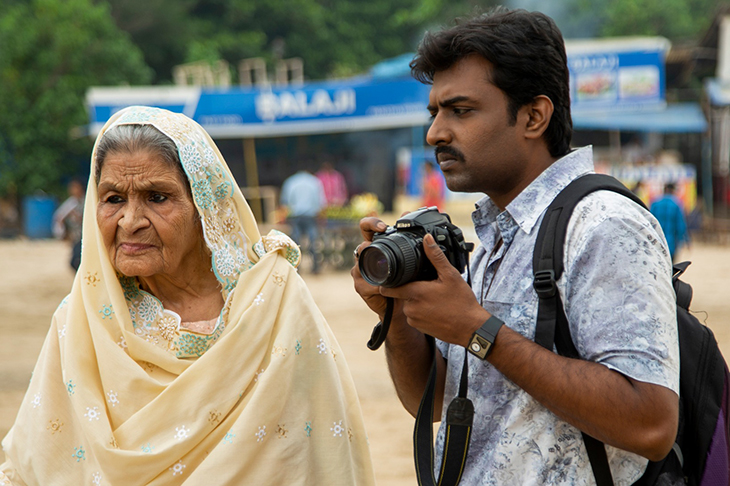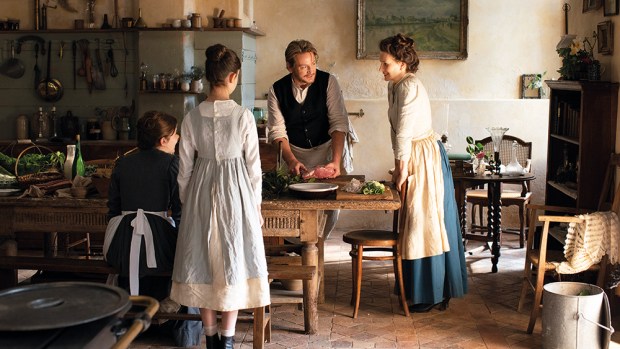Ritesh Batra had a smash hit with his gentle romance The Lunchbox (2013) and then made a couple of less impactful English language films, The Sense of an Ending and Our Souls At Night. But now he has returned to India with Photograph, which is another romance and it is slow, slow, so very slooooooow. I am a fan of non-action films, as we know, but here the longueurs have longueurs which, in turn, have longueurs, plus the characters are so internalised they are essentially inscrutable. I wanted to shake them all and implore: ‘For God’s sake, just say or do something!’
It is set in a gorgeously filmed Mumbai — the light is absolutely ravishing — and in the opening moments we meet Rafi (Nawazuddin Siddiqui) who takes photographs of tourists at the Gateway of India, urging them to preserve this moment in time. (Don’t we all have smartphones for that now?) Here, he meets Miloni (Sanya Malhotra), who agrees to have her photograph taken — she seems to go along with everything, does Miloni — but is then summoned by her family, so darts away without paying. The plot, which is basically standard rom-com, comes into play because Rafi wants to get his grandmother off his back. She still lives in their home village and is refusing to take her medication unless Rafi becomes betrothed. So he sends her the picture of Miloni, saying this is his bride-to-be, and next thing he knows grandma (Farrukh Jaffar) is en route to Mumbai to meet her. So Rafi must now track Miloni down.
Miloni, star pupil at an accountancy college, wanted to be an actress but her parents said no, Miloni, accountancy is for you. We learn this when her parents talk over her at dinner, as if she doesn’t exist, yet she does not object. Miloni’s family are middle class and live in an airy apartment with a maid whereas Rafi sleeps in a single room with four other street photographers, so it’s not a match her family would ever countenance. But he tracks her down, of course. Yet the pivotal scene where he explains why he had to find her has been excised. We just see Miloni after she has agreed to pretend to be his fiancée. I sort of understand. I think what Batra is saying is: this story is so familiar I can almost not tell it. And he’s teasing us in this way. Clever, maybe, but in not telling it he also skips some crucial character development. What was Miloni’s reaction? Why would she agree? Also, I should add, Miloni and Rafi do not seem at all troubled about deceiving grandma. I liked grandma, and was troubled.
Miloni and Rafi say little. It’s a romance almost entirely conducted in looks and near-silence and staring out of bus windows. (I liked grandma because she was lively if cantankerous.) However, along the way, we are allowed to pick up a few details about the main characters. Rafi had to leave school early and is sending money home to pay off his father’s debts. Miloni yearns to live in the country and become a farmer, which seems plain daft. Miloni is so passive I particularly wanted to shake her and say: ‘Love, you’re still so young. Finish your accountancy degree then see what’s what.’ Both Rafi and Miloni, who are endlessly trapped in their own thoughts, remain opaque, plus there are quite a few detours that don’t properly go anywhere. One takes in a ghost and another is to do with a brand of cola. There are some nice touches, and the bustle of Mumbai is always fascinating, and the performances are good all-round, but whatever Batra hoped this would add up to it doesn’t.
That said, the ending is an interesting surprise. It’s an ending that says: you already know the ending, so let’s stop here.
Got something to add? Join the discussion and comment below.
Get 10 issues for just $10
Subscribe to The Spectator Australia today for the next 10 magazine issues, plus full online access, for just $10.
You might disagree with half of it, but you’ll enjoy reading all of it. Try your first month for free, then just $2 a week for the remainder of your first year.














Comments
Don't miss out
Join the conversation with other Spectator Australia readers. Subscribe to leave a comment.
SUBSCRIBEAlready a subscriber? Log in